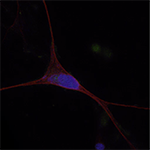News
Read the latest news from Northwestern University Feinberg School of Medicine’s basic science academic departments. The links below take you to articles where you can learn more about our faculty’s latest achievements.
Biochemistry and Molecular Genetics
 01.26.2026
01.26.2026Northwestern Medicine scientists have discovered new mechanisms underlying transcriptional initiation and elongation control that support proper gene expression, which may inform targeted therapeutic approaches for many diseases, according to a recent study published in Molecular Cell.
 01.08.2026
01.08.2026A Northwestern Medicine study has revealed a connection between two fundamental cellular processes, offering fresh insight into how human cells build and maintain chromatin, according to findings published in Molecular Cell.
 12.22.2025
12.22.2025In a landmark effort to understand how the physical structure of our DNA influences human biology, Northwestern investigators and the 4D Nucleome Project have unveiled the most detailed maps to date of the genome’s three‑dimensional organization across time and space, according to a new study published in Nature.
Cell and Developmental Biology
 02.05.2026
02.05.2026A Northwestern Medicine study has shed light on one of the most intricate construction projects in biology: how cells build and coordinate the internal scaffolding needed to create a healthy egg, according to a recent study published in the Journal of Cell Biology.
 12.15.2025
12.15.2025The tiniest parts of the cell may provide new insights into challenging neurodegenerative diseases like amyotrophic lateral sclerosis (ALS). New research from Northwestern University has revealed a key mechanism underlying the development of motor neuron diseases, such as ALS, offering new insights into potential treatment options. This new finding published in the Journal of Neuroscience, comes from the lab of Vladimir Gelfand, PhD, and may help inform the treatment of ALS and other motor neuron diseases.
 12.09.2025
12.09.2025Constadina (Dina) Arvanitis, PhD, director of Feinberg’s Center for Advanced Microscopy, has been honored with the 2025 Royal Microscopical Society (RMS) Vice President’s Award for her outstanding leadership and service to the global scientific imaging community.
Microbiology-Immunology
 02.04.2026
02.04.2026Lyme disease, the bacterial infection transmitted by ticks, is the most common vector-borne disease in the United States, with nearly half a million people diagnosed and treated each year, according to the CDC. Two pivotal studies on Lyme disease from the lab of Brandon Jutras, PhD, provide important insights into what may cause persistent Lyme disease symptoms in a subset of patients. This research points to some promising new directions for both diagnosis and therapeutic intervention.
 01.02.2026
01.02.2026Northwestern Medicine scientists in the laboratory of Stephen Miller, PhD, have identified the cellular and molecular mechanisms required for the antigen-specific tolerance inducing abilities of a novel nanoparticle therapy for treating autoimmune diseases, according to a recent study published in Science Advances.
 12.10.2025
12.10.2025Northwestern Medicine investigators have identified issues with most genomic sequence data for the Neisseria gonorrhoeae bacterium, findings that could complicate future epidemiological and pathogenesis studies, according to a recent study published in the Journal of Infectious Diseases.
Pharmacology
 02.12.2026
02.12.2026Northwestern University scientists have pinpointed when and where toxic proteins accumulate within the brains of Alzheimer’s patients — and discovered a decades-old Food and Drug Administration (FDA)-approved drug that can stop the accumulation process before it even begins, according to a recent study published in Science Translational Medicine.
 01.02.2026
01.02.2026In a new study published in Nature Communications, Northwestern scientists have uncovered how a critical membrane pathway controls the flow of chemical messages responsible for everything from brain activity to inflammation.
 12.19.2025
12.19.2025In a new study, scientists have identified a previously unknown driver of Alzheimer’s disease, and an experimental drug developed at Northwestern University has demonstrated further promise as an early intervention to treat the disease.
Neuroscience
 01.05.2026
01.05.2026Northwestern Medicine scientists have discovered that targeting neuronal signaling controlling aberrant learning in the striatum may improve the efficacy of a first-line therapy for Parkinson’s disease and has the potential to reduce therapy-related side effects, according to a recent study published in Science Advances.
 12.09.2025
12.09.2025The human brain is often described as the most complex network in existence, with billions of neurons exchanging signals across intricate pathways. Recent research led by Feinberg investigators is revealing how different regions of the brain coordinate and process information, and how disruptions in these networks can impact health.
 11.03.2025
11.03.2025A new Northwestern study has uncovered how a key disease protein drives overactive nerve cells in neurodegenerative diseases like ALS and frontotemporal dementia.